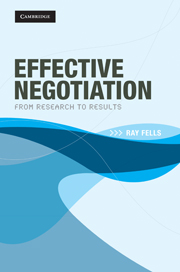Book contents
- Frontmatter
- Contents
- Acknowledgements
- 1 An introduction to negotiation
- 2 The essence of negotiation
- 3 Being strategic
- 4 The process of negotiation
- 5 Managing a negotiation
- 6 Dealing with differences
- 7 Exploring options
- 8 The end-game exchange
- 9 Negotiating on behalf of others
- 10 Cross-cultural negotiations
- Appendix 1 A preparation checklist
- Appendix 2 A negotiation review checklist
- Appendix 3 Self-reflection tools
- Appendix 4 The Strategy Framework
- Appendix 5 The Nullarbor Model
- Appendix 6 Managing competitiveness
- Appendix 7 Managing workplace negotiations
- Appendix 8 Managing a business negotiation
- Appendix 9 A culture checklist
- References
- Index
3 - Being strategic
- Frontmatter
- Contents
- Acknowledgements
- 1 An introduction to negotiation
- 2 The essence of negotiation
- 3 Being strategic
- 4 The process of negotiation
- 5 Managing a negotiation
- 6 Dealing with differences
- 7 Exploring options
- 8 The end-game exchange
- 9 Negotiating on behalf of others
- 10 Cross-cultural negotiations
- Appendix 1 A preparation checklist
- Appendix 2 A negotiation review checklist
- Appendix 3 Self-reflection tools
- Appendix 4 The Strategy Framework
- Appendix 5 The Nullarbor Model
- Appendix 6 Managing competitiveness
- Appendix 7 Managing workplace negotiations
- Appendix 8 Managing a business negotiation
- Appendix 9 A culture checklist
- References
- Index
Summary
The previous chapter cautioned against assuming that the DNA of negotiation – reciprocity, trust, power, information exchange, ethics and outcome – automatically develops once the parties start negotiating. Negotiators have to work hard to build these elements into their negotiation and guard against their misuse as a negotiation progresses. The distinction between the issue and the process gives scope to developing an effective approach to the task of reaching agreement. This chapter focuses on managing the issue being negotiated and develops a strategic approach to this aspect of negotiation. (The process by which agreements are reached will be discussed in Chapter 4.)
Consider a situation where two negotiating parties have met and thoroughly explored their differences but are still in disagreement over a key issue. They agree to meet again. What should be done to try and break the impasse? The most common response would be to get an agreement that a concession should be made. This almost intuitive response reflects a desire to be cooperative, a preference for agreement rather than conflict. It may well be the correct response to the situation but it may not. How does a negotiator know?
Besides being cooperative and agreement oriented, this instinctive ‘we need to make a concession’ response to an impasse reflects closed, linear thinking. It is no different from a negotiator who – come what may – says, ‘I'm not going to give in on this issue.’
- Type
- Chapter
- Information
- Effective NegotiationFrom Research to Results, pp. 39 - 57Publisher: Cambridge University PressPrint publication year: 2009



